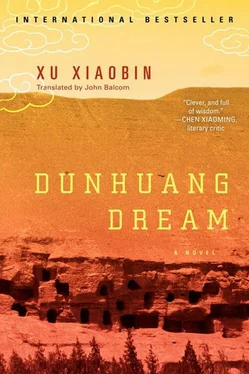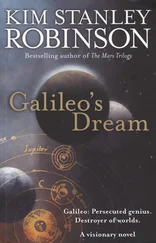Three years before, Zhang Shu had departed on a mysterious journey to the Hexi Corridor in Gansu Province. No one thought he would return, or at least not return to his wife.
But he did come back, as suddenly as he had left.
His wife, Wang Xiyi, was the daughter of the party secretary to one of the provincial committees. She was as lovely as her name and was known far and wide as a talented young woman. They had a cute and well-behaved son by the name of Zhang Gu. He’s twelve years old now.
No one really understood the reason for the loneliness in Zhang Shu’s eyes.
Not counting myself, of course. This is not to say that I have the ability to decipher the secret signs of the soul. It’s quite simple — Zhang Shu told me everything. To be more precise, he chose me. We’re not exactly close friends, and I’m usually too busy to sit down and have a chat, but that’s probably why he chose me.
“How is Xiao Xingxing? Are you in touch with her?” Seeing his hairline, which had receded even more, a small path flashed before my eyes.
He shook his head. The small path was suddenly blocked.
“Perhaps she was right when she said a good man and a good woman will never be together, never. So stop daydreaming,” he said.
3
Zhang Shu met Xiao Xingxing at the guesthouse on Sanwei Mountain at Dunhuang in Gansu.
It was on the third day after he arrived at Dunhuang on a damp, fresh morning, something rare in the Northwest. And it was the first time he had heard a pure Beijing accent since his arrival. Years later, he would remember that pleasing voice, which had allowed him to relax, feeling as if he had returned to familiar territory.
That clear ringing voice was talking about national ration coupons with the old manager.
“Do you need some coupons? I have some.” He hastened over. He had never been so forward in his life, and those who knew him would have been surprised.
Standing, profile toward him, the young woman turned. The first thing he saw, of course, was her eyes, those eyes of hers — big, bright, and black as lacquer. Many years later he realized where he had gone wrong: he shouldn’t have looked at her eyes first! That’s because her other features were so ordinary. If at the time he had first looked at her nose or her forehead, he, in all likelihood, would not have been so absurdly infatuated.
The young woman seemed as fresh as the morning. She looked sharp and lively in her short, casually brushed hair. She fixed her large, bright eyes on him. The tip of her nose was slightly upturned (it was the sort of cute, small, upturned nose rarely seen among Chinese women!). Her full lips resembled a deep red rosebud. Her tanned face was lightly freckled, but from her neck down to her exposed collarbone, her skin was a brilliant white. She was dressed simply in a loose white cotton T-shirt and a pair of denim shorts. She was not tall, but full figured and light on her feet. As the morning breeze lifted her hair, she seemed bathed in the splendor of youth.
She was different and, from beginning to end, mysterious. She spoke to him in her gentle way, “Oh, you have ration coupons? That’s so good of you!” He felt her manner of speech did not fit her appearance; she should have been more lively, more straightforward, more blunt and to the point. But her tone of voice never varied. Yes, from beginning to end, she maintained a distance between them, never once affording him the opportunity to get close.
Perhaps it was this distance that made her mysterious and beautiful, and why he never felt disappointed in her. Maybe it was cunning on her part.
“When did you arrive?” He took the ration coupons from his stiff, worn wallet and handed them to her as if he were moving a chess piece.
“Last night.” She smiled as she accepted them. “I never expected to run into someone from home here. That’s wonderful”
“What do you need the ration coupons for? The dining hall in the guesthouse doesn’t require them.”
“I don’t feel like eating in the dining hall. I can get rice with the coupons and cook for myself.”
Zhang Shu smiled. “What do you do?”
“I paint. Did you see the Halfway Exhibition ? Do you recall that half of a bull’s head? Xiao Xingxing.” As she smiled, her eyes narrowed to slits.
“Ah, the painter,” he said, hesitatingly. He had seen the Halfway Exhibition and remembered the name Xiao Xingxing. However, he seemed to recall that Xiao Xingxing the painter was about thirty years old and found it impossible to match her with the vibrant young woman before him.
“And what do you do?” Xiao Xingxing’s eyes twinkled.
Zhang Shu laughed. “Nothing. I don’t even have a job. I came here to see the Mogao Caves.”
“You quit your job?”
“Yeah.”
“That takes guts. I wish I could do the same; I’ve thought about it for years but could never bring myself to do it.” As she spoke, she fanned herself with her hat. At first he thought it was because of the heat, but later he realized it was just a habit of hers.
“You don’t strike me as someone lacking in nerve.”
“Really? That’s just the problem, I suppose. I look brave, but I’m not. Well, it’s been nice meeting you. I’ve got to go buy some rice now.”
“I have a couple of packages of instant noodles.”
“That’s okay. I really don’t care for them.” She had already moved away some distance. He found it strange that she could walk so fast. She was full figured, but stepped lightly as if her feet had wings. Her voice had a rhythm all its own; he was sure she could sing.
4
At that time, Zhang Shu was close to forty. His background was typical of his generation. He lived seriously in his youth. In that fanatical time, he was present seven of the eight times Chairman Mao received the Red Guards, but he always regretted missing that one time. It was traveling around the country during the “Great Link-up,” as it was called in those days, that changed him. With thirty yuan in his book bag, he traveled to the far reaches of the country. Running wild and unrestrained, he learned the meaning of poverty and foolishness. He stood like a blockhead for long hours in foul-smelling, crowded trains. After returning to Beijing he would have nothing more to do with revolution. He just kept his mouth shut. In silence, calm and unhurried, he went to a police substation to cancel his Beijing residence registration and then left for a poverty-stricken village in the mountains of northern Shanxi province, where he would spend eight whole years. In order to make it back to Beijing in time to take advantage of the reforms in the high school exam system to compensate for their interrupted educations during the Cultural Revolution, many of the older intellectuals vied with one another to get on the last train, but not him. Watching the overloaded train depart before his very eyes, he handled it as he had handled so many things over the years — he took a long-term wait-and-see attitude.
He wasn’t without accomplishments, though. Many of his friends said that he was lucky in love and that his wife had willingly walked into his trap. She was not only pretty and competent, but more important, she was the daughter of a provincial party secretary. This in itself was sufficient to increase respect for him. No one could figure out or explain how a quiet guy like him had managed to snare a woman like her. He was, needless to say, quite handsome — tall, thick hair, swarthy, with eminently proper looks. His unshakably cool and stern temperament, that “strong, silent type” that has been preferred by women the last few years. But the daughter of the provincial party secretary soon learned that “reserved” didn’t necessarily translate into food on the table. She had married an incompetent husband, entirely out of step with the times. The worst was that they soon had a child and then it was too late for regrets. Wang Xiyi began to show her displeasure through her expressions, by breaking things, and by verbally abusing her husband. She went out to have fun and later to work, leaving the child at home with him. He silently assumed responsibility for raising the child. Days turned into years, and he fulfilled his duty as the “mother” of the house. Even in the days after he had an accident and scalded his feet, everyone saw him hobbling with the aid of two canes, struggling against a freezing wind, to pick up the child at the kindergarten. But gradually, the daughter of the provincial party secretary was moved, or perhaps, for some other reason, she suddenly decided to come home. The moment she decided he deserved better, she immediately decided to quit the job she had obtained through her father and join her husband in the northwest with which he was so familiar.
Читать дальше







![Theresa Cheung - The Dream Dictionary from A to Z [Revised edition] - The Ultimate A–Z to Interpret the Secrets of Your Dreams](/books/692092/theresa-cheung-the-dream-dictionary-from-a-to-z-r-thumb.webp)




